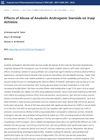 32 citations,
January 2018 in “American Journal of Clinical Dermatology”
32 citations,
January 2018 in “American Journal of Clinical Dermatology” Hormone therapy affects hair growth in transgender individuals, with testosterone potentially causing hair loss in trans men and estrogen reducing facial/body hair in trans women; treatment options vary.
9 citations,
October 2018 in “Medical Science Monitor” Lowering certain hormone levels improves treatment for hair loss in young men.
 2 citations,
September 2012 in “PubMed”
2 citations,
September 2012 in “PubMed” Topical minoxidil effectively treats Female Pattern Hair Loss in women of all ages and hormone levels, but evidence for antiandrogens is limited.
August 2024 in “Journal of Controlled Release” A new treatment using hybrid vesicles with gold nanoparticles and finasteride significantly improves hair regrowth for androgenetic alopecia.
 1 citations,
December 1992 in “International Journal of Dermatology”
1 citations,
December 1992 in “International Journal of Dermatology” No significant hormone differences found in postmenopausal women with androgenetic alopecia.
 4 citations,
April 2002 in “Medical Hypotheses”
4 citations,
April 2002 in “Medical Hypotheses” Hormones cause hair loss by affecting cell growth and weakening cell attraction.
 64 citations,
August 1999 in “The American journal of medicine”
64 citations,
August 1999 in “The American journal of medicine” The transscrotal testosterone patch normalizes hormone levels in men with AIDS and weight loss but does not improve weight, body mass, or quality of life.
3 citations,
June 2017 in “Reproductive biomedicine online” A certain mutation in the fetal alpha 5-reductase gene is linked to a higher risk of late miscarriage.
 March 2017 in “Iraqi Journal of Pharmaceutical Sciences”
March 2017 in “Iraqi Journal of Pharmaceutical Sciences” Abuse of anabolic steroids in Iraqi athletes leads to negative effects on hormones, liver and kidney function, blood sugar, and cholesterol levels.
3 citations,
February 2002 in “The American journal of psychiatry” Stopping birth control pills may have triggered a manic episode in a woman with HAIR-AN syndrome.
 989 citations,
August 2007 in “The Lancet”
989 citations,
August 2007 in “The Lancet” PCOS is a complex condition with major health impacts, needing more research for better diagnosis and treatment.
 1 citations,
January 2020 in “Elsevier eBooks”
1 citations,
January 2020 in “Elsevier eBooks” Hormone therapy is safe and effective for transgender adults, but requires regular monitoring and mental health support.
 12 citations,
January 2003 in “Dermatology Online Journal”
12 citations,
January 2003 in “Dermatology Online Journal” A new treatment for hair loss was tested and most participants saw their hair loss stop within 2-8 weeks, with up to 50% more hair after 4 months, and no side effects.
 180 citations,
January 2003 in “American Journal of Clinical Dermatology”
180 citations,
January 2003 in “American Journal of Clinical Dermatology” Menopause can lead to skin and hair problems due to hormonal changes, but hormone replacement therapy might help slow these effects.
4 citations,
January 2020 in “Journal of family medicine and primary care” Increasing Teneligliptin on his own caused a man's hair loss, which stopped when he ceased the medication.
 53 citations,
May 1986 in “Clinics in endocrinology and metabolism”
53 citations,
May 1986 in “Clinics in endocrinology and metabolism” Androgens like testosterone affect hair growth and oil production differently across body parts and individuals.
 61 citations,
January 2017 in “Human Reproduction Open”
61 citations,
January 2017 in “Human Reproduction Open” The review recommends hormone replacement therapy for women with premature ovarian insufficiency to manage symptoms and protect health, with specific approaches for different groups.
 81 citations,
September 2005 in “The American journal of pathology”
81 citations,
September 2005 in “The American journal of pathology” Activin helps skin growth and healing mainly through stromal cells and affects keratinocytes based on its amount.
 5 citations,
January 2021 in “Biomedicine & Pharmacotherapy”
5 citations,
January 2021 in “Biomedicine & Pharmacotherapy” Policosanol helps treat hair loss by balancing hormones and supporting hair growth.
 April 2024 in “Canadian Women s Health Today”
April 2024 in “Canadian Women s Health Today” PCOS treatment focuses on lifestyle changes and specific medications to manage symptoms and complications.
 5 citations,
January 2014 in “BioMed Research International”
5 citations,
January 2014 in “BioMed Research International” Hormonal status significantly affects women's skin health throughout their lives.

Individualized treatment plans, including lifestyle changes and specific medications, are crucial for managing PCOS in adolescents.
 64 citations,
August 2019 in “Circulation”
64 citations,
August 2019 in “Circulation” ADT, especially enzalutamide, may increase the risk of heart rhythm problems and sudden death in men.
 28 citations,
January 2015 in “Journal der Deutschen Dermatologischen Gesellschaft”
28 citations,
January 2015 in “Journal der Deutschen Dermatologischen Gesellschaft” Women with scarring alopecia have a lower quality of life and more anxiety and depression than those with non-scarring alopecia.
 33 citations,
January 2018 in “The Journal of Clinical Endocrinology & Metabolism”
33 citations,
January 2018 in “The Journal of Clinical Endocrinology & Metabolism” Metformin improves menstrual cycles and hormone levels in women with PCOS, mostly within the first 6 months.
 6 citations,
January 2007 in “Actas dermo-sifiliográficas/Actas dermo-sifiliográficas”
6 citations,
January 2007 in “Actas dermo-sifiliográficas/Actas dermo-sifiliográficas” Gray hair regained color after thyroid hormone treatment.
 4 citations,
January 2019 in “PubMed”
4 citations,
January 2019 in “PubMed” Patterned hair loss in women is linked to hormonal imbalances and biochemical changes, and should be evaluated for underlying health issues.
 10 citations,
May 1995 in “Journal of General Internal Medicine”
10 citations,
May 1995 in “Journal of General Internal Medicine” Most women with excessive hair growth have PCOS; treatment varies and focuses on preventing new hair, with electrolysis as the only permanent removal method.
 January 2024 in “Frontiers in endocrinology”
January 2024 in “Frontiers in endocrinology” Treating early puberty with hormone therapy may increase the risk of polycystic ovary syndrome in adults.
 1 citations,
July 2023 in “Frontiers in Immunology”
1 citations,
July 2023 in “Frontiers in Immunology” Oxidative stress and immune dysfunction are linked to both Hashimoto's thyroiditis and polycystic ovary syndrome, with diet and specific treatments important for managing these conditions.
























